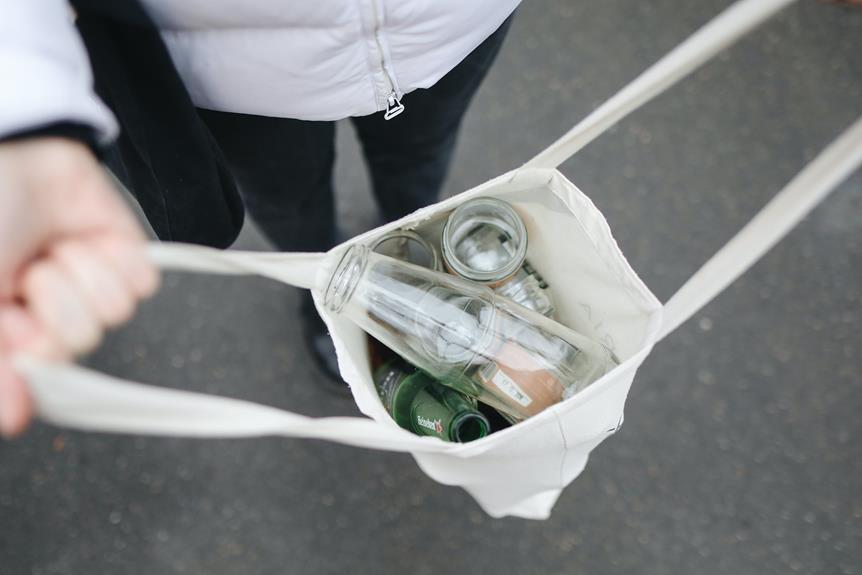10 Effective Methods for Reducing Waste Sustainably
Are you tired of feeling overwhelmed by the amount of waste we produce? We have a solution for you! In our article, we present ten effective methods for reducing waste sustainably.
From composting to recycling, we offer practical and easy-to-implement strategies to make a positive impact on our environment. Join us on this journey towards a cleaner and greener future. Together, let’s take action and create a sense of belonging in a community that values sustainability.
Composting
To effectively reduce waste sustainably, we can start by implementing composting as a means of organic waste management. Composting is a simple and practical technique that involves the decomposition of organic materials, such as food scraps and yard waste, into nutrient-rich soil. By diverting these materials from landfills, we not only reduce the amount of waste that ends up in landfill sites but also reap the numerous benefits of composting.
Firstly, composting helps to enrich the soil, improving its fertility and structure. Secondly, it reduces the need for chemical fertilizers, promoting natural and sustainable gardening practices. Additionally, composting reduces greenhouse gas emissions, as organic waste in landfills produces harmful methane gas.
With various composting techniques available, such as backyard composting and vermiculture, anyone can easily implement this environmentally friendly practice and contribute to waste reduction efforts.
Recycling
Now let’s delve into how we can further reduce waste sustainably by incorporating recycling into our waste management practices.
Recycling plays a crucial role in minimizing the amount of waste that ends up in landfills or incinerators. By collecting and processing materials such as paper, plastic, glass, and metal, we can turn them into new products, conserving resources and reducing the need for raw materials extraction.
To effectively incorporate recycling into our waste management, it’s important to educate ourselves and our communities about the different recycling programs available and the proper way to sort and prepare recyclables.
Additionally, supporting initiatives that promote recycling, such as establishing recycling centers and advocating for policies that prioritize recycling, can greatly contribute to making recycling a sustainable waste management solution.
Let’s remember, every action we take towards recycling contributes to the conservation of resources and the protection of our environment.
Source Reduction
One effective method for reducing waste sustainably is by implementing source reduction measures.
Source reduction refers to the strategies and practices aimed at preventing waste from being generated in the first place. By focusing on reducing waste at its source, we can minimize the environmental impact and conserve resources.
There are various ways to achieve source reduction, such as adopting lean manufacturing processes, redesigning products to be more durable or reusable, and promoting responsible consumption habits. These measures not only reduce the amount of waste generated but also save energy, reduce pollution, and lower costs.
Implementing source reduction practices is a proactive approach to waste reduction that benefits both the environment and our communities.
Let’s work together to embrace source reduction and create a more sustainable future by reducing waste at its root.
Upcycling
When it comes to reducing waste sustainably, upcycling is a creative and practical solution. By repurposing waste materials, we can give them new life and purpose, reducing the need for new resources.
Not only does upcycling help to minimize waste, but it also has significant environmental benefits, such as reducing energy consumption and carbon emissions.
It’s important to note that upcycling is different from recycling, as it involves transforming waste into higher-value products rather than breaking it down into raw materials.
Creative Waste Repurposing
By repurposing waste creatively, we can significantly reduce our environmental impact. Here are some repurposing ideas and waste reduction techniques that you can easily implement in your daily life:
- Turn old clothing into reusable bags: Cut up old t-shirts or jeans and sew them into trendy tote bags. This not only reduces textile waste but also eliminates the need for single-use plastic bags.
- Transform glass jars into storage containers: Instead of throwing away glass jars, clean them and use them to store pantry items like spices, nuts, or dried fruits. You can also use them to organize your workspace by storing small stationery items like paper clips and rubber bands.
- Repurpose food scraps into compost: Instead of throwing away vegetable peels, coffee grounds, and eggshells, start composting. Composting not only reduces waste but also creates nutrient-rich soil for your garden.
Environmental Benefits of Upcycling
Let’s explore the environmental benefits of upcycling and how it can further reduce waste sustainably.
Upcycling is a creative and innovative way to transform waste materials into new, useful products. By upcycling, we can reduce the amount of waste sent to landfills and minimize our impact on the environment.
There are numerous benefits to upcycling, including the reduction of raw material consumption and energy usage. By repurposing items instead of buying new ones, we can conserve valuable resources and decrease the demand for production.
Additionally, upcycling promotes creativity and community engagement, as it encourages individuals to think outside the box and share their upcycling ideas with others. By embracing upcycling, we can play an active role in creating a more sustainable future while fostering a sense of belonging within our communities.
Upcycling Vs. Recycling
One effective method for reducing waste sustainably is through upcycling instead of recycling. While recycling is a widely-known practice, upcycling offers several advantages over traditional recycling methods.
Here are three reasons why upcycling is a great alternative to landfilling and incineration:
- Reduced waste: Upcycling allows us to transform waste materials into new and useful products, reducing the amount of waste that ends up in landfills or incinerators.
- Energy conservation: Unlike recycling, which requires energy-intensive processes to break down and reprocess materials, upcycling minimizes the need for additional energy consumption.
- Creative expression: Upcycling encourages creativity and innovation by finding new and unique uses for discarded items, allowing individuals to express their individuality while reducing waste.
Related Article: Sustainable Living Made Easy: 9 Tips for Recycling and Upcycling.
Reusing
To start reducing waste sustainably, we can begin by embracing the practice of reusing. Reusing is a simple yet effective way to minimize waste and its impact on the environment. By reusing items, we can reduce the need for new production and save valuable resources.
There are several benefits to reusing, such as reducing pollution, conserving energy, and saving money. To implement reusing strategies, we can start by using reusable shopping bags instead of plastic bags, opting for refillable water bottles, and repurposing old containers for storage.
Additionally, donating clothes and household items instead of throwing them away is another way to promote reusing. By incorporating these strategies into our daily lives, we can make a significant impact in reducing waste and creating a more sustainable future.
Energy Recovery
Energy recovery is an effective method for reducing waste sustainably. This approach involves converting waste into energy through processes like waste-to-energy conversion.
By utilizing renewable energy sources, such as solar or wind power, we can further reduce our reliance on fossil fuels and minimize our environmental impact.
Energy recovery not only helps us manage waste more efficiently but also contributes to a cleaner and more sustainable future.
Waste-To-Energy Conversion
Through the process of converting waste into energy, we can contribute to a more sustainable future. Waste-to-energy conversion, also known as energy recovery, is a technology that offers a practical solution to address waste management challenges.
Here are three key benefits of waste-to-energy conversion:
- Reducing landfill waste: By converting waste into energy, we can significantly reduce the amount of waste that ends up in landfills, minimizing the environmental impact and preserving valuable land resources.
- Generating renewable energy: Waste-to-energy technology allows us to harness the energy potential of waste materials, producing electricity or heat. This helps to diversify our energy sources and reduce reliance on fossil fuels.
- Decreasing greenhouse gas emissions: Waste-to-energy conversion can effectively reduce the release of methane gas, a potent greenhouse gas generated by decomposing waste in landfills. By capturing and utilizing the energy from waste, we can mitigate climate change impacts.
Renewable Energy Sources
By harnessing renewable energy sources, we can further enhance the benefits of waste-to-energy conversion and contribute to a more sustainable future.
Renewable energy sources, such as solar, wind, and hydro power, offer a cleaner and greener alternative to traditional fossil fuels.
Integrating these sources into waste management systems can help reduce greenhouse gas emissions and dependence on non-renewable resources.
Solar panels can be installed on landfill sites to generate electricity, while wind turbines can be utilized to harness wind energy from waste disposal facilities.
Additionally, waste management facilities can utilize biogas produced from organic waste to generate heat or electricity.
Sustainable Packaging
We can cut down on waste sustainably by opting for eco-friendly packaging options. Sustainable packaging plays a crucial role in reducing waste and minimizing our environmental impact. Here are three waste reduction strategies you can implement through sustainable packaging:
- Choose recyclable materials: Opt for packaging materials that can be easily recycled, such as paper, cardboard, or biodegradable plastics. These materials can be repurposed or broken down naturally, reducing the amount of waste that ends up in landfills.
- Reduce packaging size: Minimizing the size of packaging not only reduces the amount of waste generated but also saves on resources used in production and transportation. By choosing smaller packaging options, you can contribute to waste reduction efforts.
- Encourage reusable packaging: Promote the use of reusable packaging solutions, such as refillable containers or returnable packaging. This approach reduces the need for single-use packaging and encourages a circular economy, where materials are reused instead of discarded.
Community Education
To further our efforts in reducing waste sustainably, let’s now explore the importance of community education in waste reduction.
Community engagement plays a vital role in promoting sustainable practices and creating a sense of belonging among individuals. By educating our community about waste reduction strategies and sustainable practices, we can inspire and empower them to make positive changes in their daily lives.
Community education can take various forms, including workshops, seminars, and online resources, to reach a wider audience. It provides an opportunity for individuals to learn about the environmental impact of their actions and discover practical solutions to reduce waste.
Conclusion
So there you have it, folks! These ten effective methods for reducing waste sustainably are like the ultimate waste warriors.
From composting to recycling to upcycling, they’re here to save the planet one banana peel at a time. So let’s get out there and start reusing, reducing, and recycling like our trash bins depend on it. Together, we can make a difference and create a more sustainable future.
Let’s go, waste warriors!






